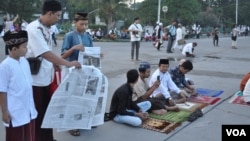After a tumultuous year of politics and religious divisions, Eid al-Fitr has come peacefully to some of Jakarta’s poorest neighborhoods, which have been particularly affected by recent events.
Thousands of faithful converged on Jakarta’s historic Sunda Kelapa fishing harbor on Sunday morning for sholat, the morning prayers of Eid al-Fitr, the festival that ends the holy month of Ramadan.
But this Ramadan, a time of fasting and reflection, followed a year of upheaval in Jakarta politics. The city was cleaved by Islamist protests against the Chinese Christian governor Ahok, whose eventual election loss came only after a maelstrom of sectarian tensions against religious minorities and ethnic Chinese Indonesians.
The coastal communities near Sunda Kelapa had a big personal stake in the Jakarta election. Historic neighborhoods like Luar Batang and Pasar Ikan (“fish market”) were targeted for evictions by the previous governor, Ahok, and combined their fight for land rights with vociferous participation in the anti-Ahok protests last year.
Many were overjoyed that his rival, Anies Baswedan, won the election, but they aren’t relaxing just yet. Pasar Ikan residents observed Eid prayers on prayer rugs laid over the rubble that underlies most of their slum, which is largely composed of makeshift tents and informal structures.
“We are still in the shadow of the threat posed by the Djarot administration,” said Dharma Diani, a Pasar Ikan resident and land rights activist, referring to Ahok’s deputy governor who is leading Jakarta until Anies takes office in October.
Even on the most festive day of the Muslim calendar, said Diani, “We are still worried, not calm yet. And we won’t be until Pak Anies is inaugurated.”
A tide turned between the Jakarta election and Ramadan, at least for the Islamist groups that have pushed the agenda in recent months. The government announced its intent to ban the hardline group Hizbut Tahrir and issued a warrant for the arrest of Habib Rizieq Shihab, who leads the Islamic Defenders’ Front, widely know as FPI.
That means Ramadan proceeded largely without incident in the world’s largest Muslim country. There was even markedly less “sweeping,” or policing establishments that serve alcohol or food during daylight hours by thuggish acolytes of groups like FPI.
Families started filtering into picturesque Sunda Kelapa, near Pasar Ikan, just after daybreak in veiled prayer robes for women and hats and shawls for the men; they rolled out prayer rugs and newspapers to sit on until the brief communal prayer at 7:30.
Afterward they decamped to houses and the streets to joyously eat during daytime for the first time in a month. Most of those who remained in Jakarta for Eid are longtime locals: during this weekend, the city empties out as most residents go back to their extended families’ villages and hometowns, a migration known as mudik.
“I’ve lived in North Jakarta my whole life, so for us, mudik has never been far,” joked Fitri, 35, a woman who attended sholat at Sunda Kelapa.
Others expressed relief that the month had come to an uneventful end. Jakarta police ramped up security around the city during the festivities.
“Alhamdulillah, we have had a peaceful Ramadan after the Jakarta election,” said Rizky, a 50-year-old man.
Indonesian Islam has long been so diverse that there isn’t even, historically, a set date for Eid, one of the most important Muslim holidays: major Muslim bodies like Nahdlatul Ulama and Muhammadiyah have disagreed on the exact date by a day, with apparently little incident. But for the past six years, the government has issued a suggested Eid date that is widely observed. Unity, meanwhile, was also a major theme of Sunday morning’s sermons.
"Our homeland stretches from Sabang [Aceh in the West] to Merauke [Papua in the East] and has allowed us to build, prosper and maintain unity," an ulama, or religious scholar, said in a sholat sermon broadcast from Istiqlal Mosque in Central Jakarta.





